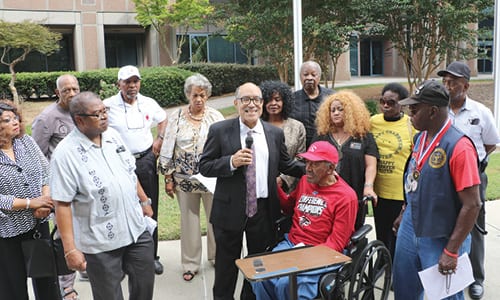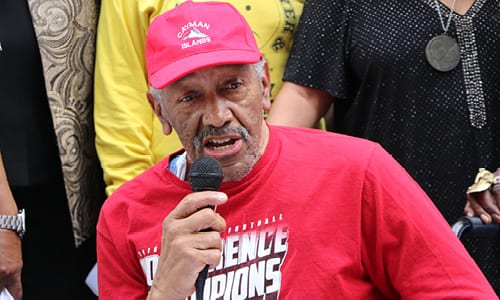
By Valerie J. Morgan
The MARTA Board of Directors approved a contract on Sept. 6 to extend bus, rail, and mobility services into Gwinnett County, paving the way for a countywide ballot referendum scheduled for March 2019.
If Gwinnett voters approve the referendum next year, MARTA would assume control of six bus routes and five express routes that take commuters to destinations inside I-285 that are currently operated by Gwinnett County Transit.
MARTA Board of Directors Chairman Robert L. Ashe said the agreement would help launch a regional transit system.
“We are excited about the opportunity to transform the region and provide greater connectivity,” Ashe said.
Said MARTA General Manager & CEO Jeffrey Parker: “Our lives don’t stop at county lines and this is a chance to further connect all the communities of metro Atlanta.”
The MARTA board’s decision, however, has touched off a firestorm among advocates who have been fighting for years to bring heavy rail to South DeKalb County.

“We’re going to start a new crusade to get some money for black folks,” said long-time South DeKalb community activist John Evans. “They have stolen from us to give to other folks for years. All of the promises have never happened. We just go to board meetings and leave empty handed.”
Under the proposed contract, a one-percent sales tax would be collected in Gwinnett County to fund transit operations, capital expenses, and expansion through 2057. Projections show the sales tax would raise approximately $170 million per year, or $5 billion during that period.
Gwinnett County recently adopted a transit development plan that envisions a heavy-rail line from MARTA’s Doraville Station to Gwinnett Place Mall along the I-85 corridor as well as bus rapid transit (BRT) and increased local bus service to serve its fast-growing population and to alleviate traffic congestion.
Viola Davis, the newly-elected State Rep. for House District 87, said she was not surprised by the MARTA board’s decision to take over transit in Gwinnett, but questioned why Gwinnett would only have to turn over a percentage of the 1 percent sales tax to MARTA.
“DeKalb has had to turn over the full 1 percent. That is not the equation mapped out for Gwinnett,” said Davis, who attended the news conference and MARTA Board meeting with Evans and others, several of whom spoke during public comments. “If they (MARTA) can’t buy the 390 shelters and benches that they’re short of after taking in over $2 billion in taxes in the last five years, how can they afford to put all of that money in Gwinnett?”
Davis said South DeKalb must demand that the MARTA address the inequity in South DeKalb.
Community activist Josie Dean said DeKalb, Atlanta and Fulton have shouldered the funding for MARTA for years and black riders were supporting MARTA when whites refused to ride public transit.
“We’re going to have to raise holy hell,” said Dean.
Former State Sen. Vincent Fort, District 39, concurred, saying: “This is what I call transit racism… The fight has only begun… The Beltline has over $400 million in this. They want all of the money. My attitude is don’t give the Beltline another dollar until they fulfill their commitment for affordable housing and make good on their promise they made 15 years ago.”
DeKalb CEO Michael Thurmond and Board of Commissioners Presiding Officer Jeff Rader said in a letter to the MARTA board that DeKalb wants the same commitment proposed to Gwinnett:
“…We believe it is as important for MARTA to renew its commitment to its original members with the same specificity and deference as the proposed contract offers to its newest prospective member.”
…For several years now, MARTA has made quarterly presentations to the DeKalb County Commission alluding to upgraded bus stops, improved amenities at MARTA rail stations, and new technologies MARTA is planning to deploy, but many of these improvements have not been accomplished. MARTA’s Comprehensive Operations Analysis has largely been experienced in DeKalb as the consolidation and elimination of routes that MARTA deems marginal, but new services and technologies purported to replace the obsolete ones have been conditioned on additional funding from DeKalb.”


![Validate my RSS feed [Valid RSS]](https://web.archive.org/web/20240108205913im_/https://ocgnews.com/wp-content/uploads/2022/07/valid-rss-rogers.png)


6 Comments
MARTA just Changed every bus route in East and S DeKalb but one. Did not have schedules printed up in time for the riders. Most of the bus routs no longer take DeKalb’s riders to Downtown Atlanta. My complaints to Commissioners Gannon and Larry Johnson went unanswered.
MARTA has forever just Short Changed DeKalb County since it’s inception.
Great to see Big John Evans out and about. Thanks to all that showed up to protect DeKalb’s Interest. And The “Brain” Jeff Rader sent a letter / Rader should have been there along with some other of DeKalb’s Elected.
MARTA has ignored South DeKalb Georgia far too long It’s time for Black Hebrews Israelites to Unite and get the MARTA RAIL SERVICES THAT WE RIGHTLY DESERVE
So does this mean that all the presentations to extend MARTA rail systems from Indian creek Stonecrest was a bait and switch??
If you look at the MARTA board of directors, chairman, and vice it’s a bit difficult to be surprised by any of this. Of the three Directors for DeKalb, none of them are black. What is the incentive for them to place any rail transportation in a community that is not their own? It is inherent that communities take care of their own. That holds true for any nation. Gwinnett is not denying a referendum either, rather holding out for a better deal. They know rail is good for business.
It’s a known fact that public transportation is a known draw for business and real-estate, but current law dictates that MARTA be the single rail provider in the 10 county region. If we require all of our representatives to propose legislation to strike that clause down we could force MARTA’s hand. If DeKalb County, Rockdale County, Lithonia, Stonecrest, and what’s left of Stockbridge would work together in joint development, it could be the start of an new light rail system (tram) similar to the Lynx in Charlotte NC. It would swing from Stone Mountain through Henry and Clayton, through the international terminal and over to South Fulton, Union City, Acworth. Even Conyers, McDonough, Jonesboro, and Riverdale may dig into their coffers if reason prevails and the old guard has died out.
These areas don’t have to bare the expense of digging tunnels, and land bridges would be minimal. There are existing corridors of nothing-but powerlines that could serve as shared real-estate. It wouldn’t be a metro system, but a commuter rail. It would link with Marta from East Point when the time comes. By then, the board of directors would have already shifted significantly. Any rail line takes about 5 years to build. I wouldn’t hold my breath until they start rolling out the land compactors.
Excellent vision of a regional system
Excellent view of routing for regional system. I had not thought about the fact that there is little need for tunneling or building bridges.